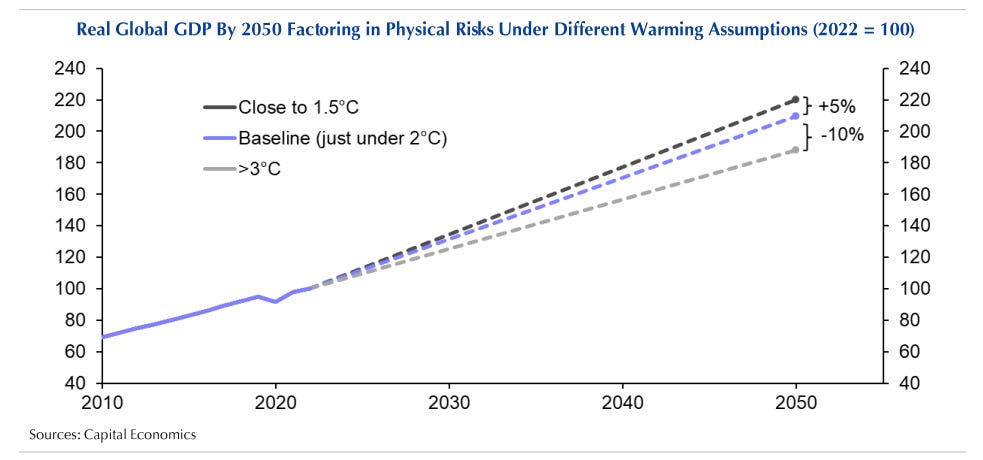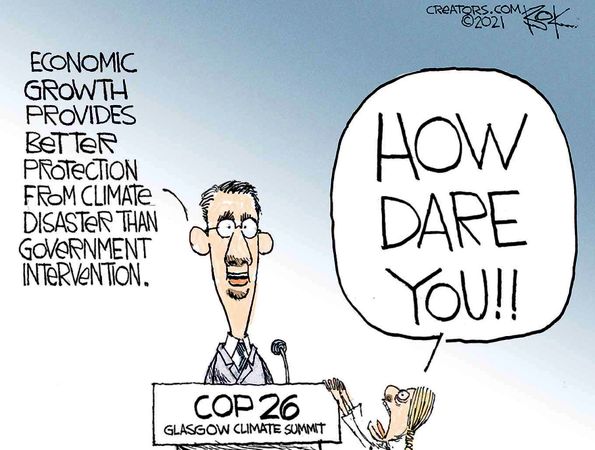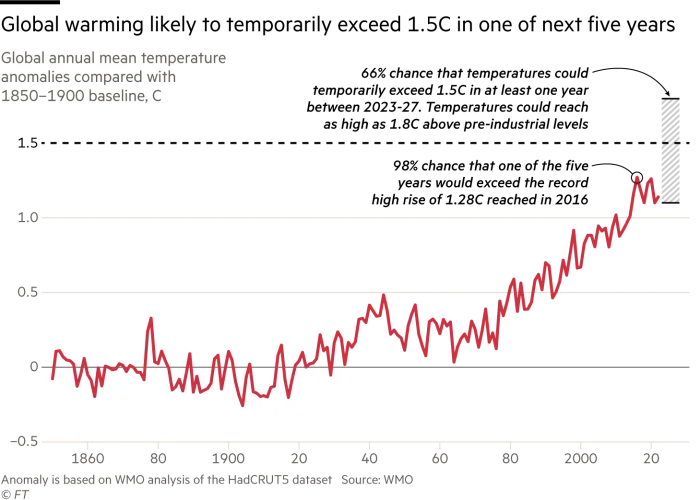The 3°C Scenario: What’s the economic impact of severe global warming? James Pethokoukis writes at his substack. Excerpts in italics with my bolds and added images.
Even with an extreme scenario, the world should be richer and more capable in 2050

(One thing to keep in mind: The firm’s baseline forecast is that the increase in global temperature will be kept just below 2°C thanks to the increasing use of renewable energy sources and other technological improvements, resulting in a ecline in global greenhouse40 percent d gas emissions by 2050. This level of warming is already baked into its economic forecast.)
Caveat: Decarbonizing Our Energy Platform is the Way to Stop Prosperity
In assembling this forecast, CE highlights some of its key decisions. First, it focused on “physical risks,” such as the impacts of more severe hurricanes and consistently higher temperatures, rather than “transition risks,” the impacts of taxes and regulations meant to mitigate climate change. What’s more, CE also tried to look for economic models that took into account the possibility of non-linear outcomes.
[Note: In ClimateSpeak, mitigation doesn’t have it’s usual meaning. “Mitigate: make something, such as a problem, symptom, or punishment, less harsh or severe.” (Mirriam-Webster). IPCC supporters speak of spending Trillions of $ on schemes to reduce carbon emissions without any guarantee of lowering climate impacts.]
But again: The impacts mentioned here won’t result in either advanced or
emerging economies becoming poorer a generation from now than they are today.
Rather, the physical effects of climate change on economic activity would create headwinds that slow growth. A country suffering some of the biggest impacts from climate change would be Indonesia. Even so, CE still expects the country to become a top-ten economy by 2050. Yet under the 3°C scenario, it would rise to become the eighth largest economy rather than the fifth largest economy under the cooler CE baseline forecast. Or India: Under both scenarios, it would still be the third largest economy by 2050, but under the 3°C scenario it only be three times as large as fourth place Germany rather than four times in the baseline.
The good news here is even with a rapid and severe climate outcome over the next 25 years, there’s good reason to think humanity will have even more economic resources and technological capabilities to do something about it — while also preparing for a future where more us can use more energy to turn our dreams into reality. Innovation-driven economic growth is what provides true resilience to America and the world.
Summary:
We have always and will continue to adapt to the effects of changing weather and climate, so long as we have the economic means to prepare and respond to events. The real threat to society, humanity and the biosphere is climate policies directed against our energy platform.
See Also Series of Posts: World of Hurt from Climate Policies




“That said, the UN’s Intergovernmental Panel on Climate Change says humanity better get used to 1.5° and higher without a drastic shift away from fossil fuels. “This to me is a non-sensical statement, I reviewed CO2 content in the earth’s atmosphere from Scripps as well as the CO2 emissions from Hydrocarbons (my word since I dislike the use of fossil fuels) & Industry from Our World in Data.In 2016, the emissions were essentially the same as 2015 and yet the rate of growth of CO2 content in the atmosphere increased by 50%. What is the source of this CO2?In 2020, the emissions were 5% less than 2019 and yet the rate of growth of CO2 content in the atmosphere increased yet again. What is the source of this CO2?My new hypothesis is that CO2 emissions from the use of hydrocarbons has no bearing at all on CO2 content in the atmosphere. I continue to be unable to find any atmospheric observations that CO2 content of the earth’s atmosphere influences anything al at..
LikeLike
Fair comment, Bruce. The economists take as a given the IPCC suppositions of global warming due to GHGs. Even so, the economic growth of our civilization will far outstrip the supposed damages from climate impacts. Of course, that growth depends on affordable reliable energy supply, which is currently under attack by wrong-headed decarbonists.
As you know, I have posted on studies showing the majority of CO2 increases in the atmosphere are natural, with human emissions a minor factor. See
LikeLike
Reblogged this on Climate Collections.
LikeLike